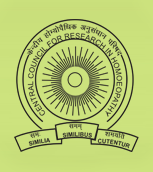Indian Journal of Research in Homoeopathy
Keywords
Attention deficit hyperactivity disorder, Fifty millesimal, Homoeopathy, Placebo, Randomised clinical trial
Article Type
Original Article
Abstract
Objective: To evaluate the usefulness of individualised homoeopathic medicines in treatment of Attention Deficit Hyperactivity Disorder (ADHD). Design: Randomised placebo-controlled single-blind pilot trial. Setting: Central Research Institute (Homoeopathy), Kottayam, Kerala, India from June 2009 to November 2011. Participants: Children aged 6-15 years meeting the Diagnostic Statistical Manual of mental disorders (DSM-IV) criteria for ADHD. Interventions: A total of 61 patients (Homoeopathy = 30, placebo = 31) were randomised to receive either individualised homoeopathic medicine in fifty millesimal (LM) potency or placebo for a period of one year. Outcome measures: Conner′s Parent Rating Scale-Revised: Short (CPRS-R (S)), Clinical Global Impression-Severity Scale (CGI-SS), Clinical Global Impression- Improvement Scale (CGI-IS) and Academic performance. Results: A total of 54 patients (homoeopathy = 27, placebo = 27) were analysed under modified intention to treat (ITT). All patients in homoeopathy group showed better outcome in baseline adjusted General Linear Model (GLM) repeated measures ANCOVA for oppositional, cognition problems, hyperactivity and ADHD Index (domains of CPRS-R (S)) and CGI-IS at T3, T6, T9 and T12 (P = 0.0001). The mean baseline-adjusted treatment difference between groups at month 12 from baseline for all individual outcome measures favoured homoeopathy group; Oppositional (−16.4, 95% CI - 20.5 to − 12.2, P = 0.0001), Cognition problems (−15.5, 95% CI − 19.2 to − 11.8, P = 0.0001), Hyperactivity (−20.6, 95% CI − 25.6 to − 15.4, P = 0.0001), ADHD I (−15.6, 95% CI − 19.5 to − 11.6, P = 0.0001), Academic performance 14.4%, 95% CI 8.3 to 20.5, P = 0.0001), CGISS (−1.6, 95% CI − 1.9 to − 1.2, P = 0.0001), CGIIS (−1.6, 95% CI − 2.3 to -0.9, P = 0.0001). Conclusion: This pilot study provides evidence to support the therapeutic effects of individualised homoeopathic medicines in ADHD children. However, the results need to be validated in multi-center randomised double-blind placebo-controlled clinical trial.
Digital Object Identifier
10.4103/0974-7168.123389
Publisher
Wolters Kluwer India Pvt. Ltd.
How to cite this article
Oberai P, Gopinadhan S, Varanasi R, Mishra A, Singh V, Nayak C. Homoeopathic management of attention deficit hyperactivity disorder: A randomised placebo-controlled pilot trial. Indian J Res Homoeopathy 2013;7(4):158-167. doi: 10.4103/0974-7168.123389


